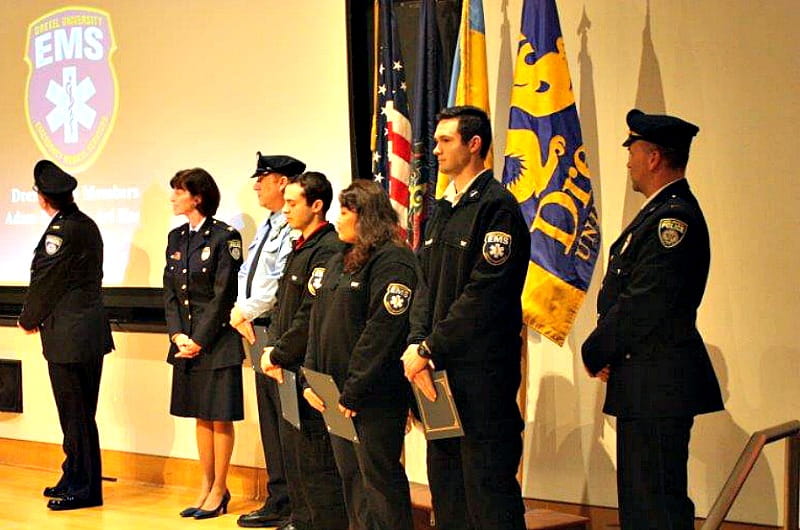Drexel’s Emergency Medical Services Student Organization Named One of the Best in the Country
 By Alissa Falcone
By Alissa Falcone

Drexel became one of only nine colleges in the country to have its student-run emergency medical services organization formally recognized by the National Collegiate Emergency Medical Services Foundation, a nonprofit professional organization that promotes the development of campus-based emergency response groups.
The national organization’s EMS Ready Campus program awarded Drexel’s Emergency Medical Services (EMS) organization a bronze recognition — the highest honor that colleges in the country have thus received — for going above and beyond in emergency management and disaster preparedness.
“Only nine schools have received this award and Drexel is now of them,” said Hendrik Bilek, chief of EMS and a nursing junior in the College of Nursing and Health Professions. “This is something that we worked really hard on to get and now we’re proud to have it and bring it back to Drexel.”
Bilek and the other dedicated full-time students in EMS work closely with the Department of Public Safety. They respond to an emergency on campus and provide medical care before the dispatched ambulance and Philadelphia Fire Department arrive.
Founded in 2010, the organization is a student group that falls under the Department of Public Safety. Most of the members are licensed EMTs under the Commonwealth of Pennsylvania and other students are in training to become EMTs or are registered in CPR.
“We’re professional medical responders who also happen to be full-time students,” said Bilek.
Bilek was inspired by his father, a firefighter and EMT, to register as an EMT in high school and volunteer with his local fire department. Bilek enrolled at Drexel in part because of its EMS organization.
And he’s not the only one.
“We have a lot of students who are EMTs and they don’t want to stop because they’re going to school, so now they have a way to provide their service to the campus,” he said.
In addition to carrying anywhere from 12 to 20 courses or a full-time co-op each term, Bilek and other student members regularly work six- or 12-hour EMS shifts during the week and weekend. They operate from a room in the University Crossings building on campus and are on duty from 7 p.m. to 1 a.m. on Wednesday and Sunday nights and from 7 p.m. to 7 a.m. on Thursday, Friday and Saturday nights.
“On a college campus, those are kind of our busy hours, as you can imagine,” said Bilek.
With Public Safety, the group has developed and practiced plans, protocols, procedures and drills for everything and anything that could happen.
“Drexel EMS has consistently sought ways to improve the delivery of emergent care to the students, staff and visitors of our community,” said Department of Public Safety’s Director of Fire and Emergency Services David W. Hollinger. “Their recent recognition as EMS Campus Ready by the National Collegiate Emergency Medical Services Foundation is another example of their commitment.”
EMS trains with similar organizations at local universities like Temple and Penn to practice drills and exercises for emergencies throughout the city of Philadelphia. Exercises include responding to an active shooter on campus, or if last year’s Amtrak train crash had happened closer to its 30th Street Station.
“EMS is one of those things where you prepare for the worst and hope for the best,” said Bilek. “You can learn not only medicine but also management and stress response in unpredictable situations.”
EMS also provides services at campus events and holds blood drives for the American Red Cross. Members teach CPR classes on campus and are currently working on getting a pre-hospital trauma life support class to provide certification for pre-hospital providers.
Students in EMS can obtain a professional license as an emergency medical technician before they graduate from Drexel. Members aren’t required to become an EMT before or even after joining, and students can receive funding to take EMT classes. Students don’t have to be nursing or pre-health majors, though most members are based on the nature of the organization. Engineering, culinary arts and chemistry students have joined the club and it’s always appreciated when students bring their own experience and expertise to the group.
“Part of the organization is that we want to take people who have a passion for helping people in emergency medicine,” said Bilek. “We’re really focused on bringing preventative medicine as well as giving people resources and information so they can help themselves and their community.”